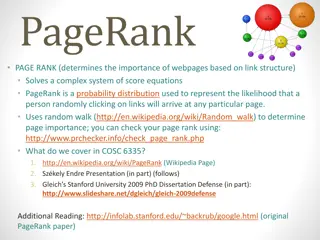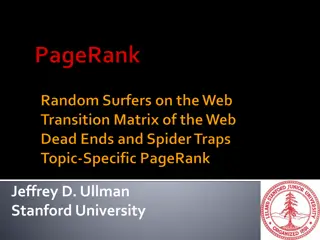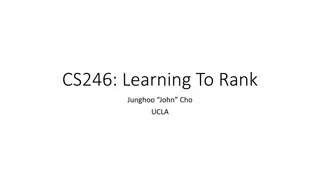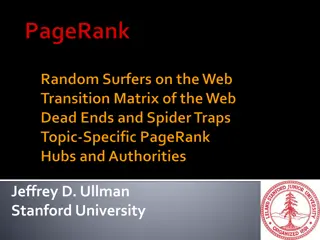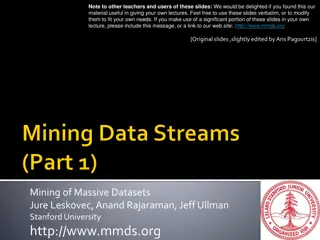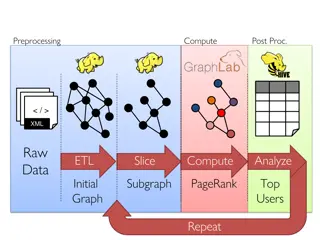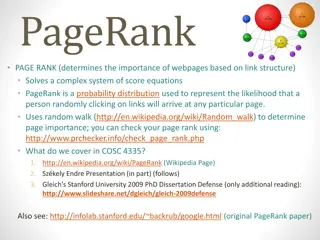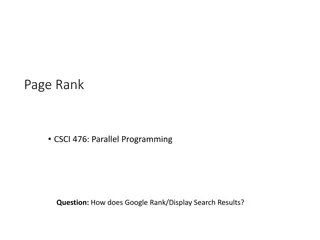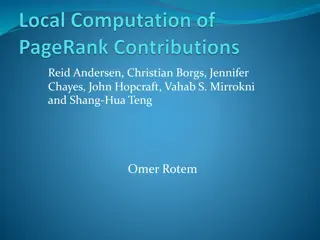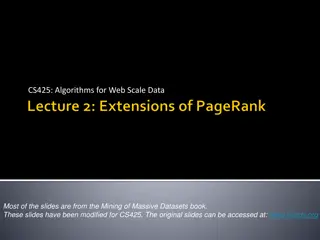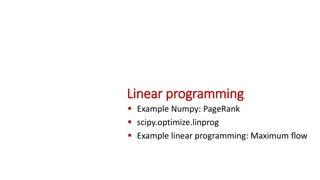PageRank: Importance of Webpages and Link Structure
PageRank, a probability distribution determining webpage importance based on link structure, utilizes a random walk to assess page significance. It employs a Surfer Model to identify important pages within a web structure. This algorithm, developed by Larry Page and Sergey Brin at Stanford Universit
2 views • 41 slides
PageRank and Random Surfer Model
Explore the concepts of PageRank and the Random Surfer Model through the importance of web pages, recursive equations, transition matrices, and probability distributions. Learn how page importance is determined by links from other important pages and how random surfers navigate the web.
12 views • 48 slides
PageRank Algorithm in Web Search
Dive into the intricacies of the PageRank algorithm, a key component of web search, which ranks web pages based on their importance and influence. Explore topics like link analysis, recursive formulation, flow model, and matrix formulation to grasp how PageRank determines the relevance and credibili
5 views • 25 slides
Learning to Rank in Information Retrieval: Methods and Optimization
In the field of information retrieval, learning to rank involves optimizing ranking functions using various models like VSM, PageRank, and more. Parameter tuning is crucial for optimizing ranking performance, treated as an optimization problem. The ranking process is viewed as a learning problem whe
5 views • 12 slides
Challenges and Opportunities in Processing-in-Memory Architecture
PIM technology aims to enhance performance by moving computation closer to memory, improving bandwidth, latency, and energy efficiency. Despite initial setbacks, new strategies focus on cost-effectiveness, programming models, and overcoming implementation challenges. A new direction proposes intuiti
5 views • 43 slides
PageRank Algorithm: A Comprehensive Overview
The PageRank algorithm plays a crucial role in determining the importance of web pages based on link structures. Jeffrey D. Ullman from Stanford University explains the concept of PageRank using random surfer model and recursive equations, emphasizing the principal eigenvector of the transition matr
4 views • 55 slides
Stream Management and Online Learning in Data Mining
Stream management is crucial in scenarios where data is infinite and non-stationary, requiring algorithms like Stochastic Gradient Descent for online learning. Techniques like Locality Sensitive Hashing, PageRank, and SVM are used for critical calculations on streaming data in fields such as machine
3 views • 46 slides
Data Processing and Analysis for Graph-Based Algorithms
This content delves into the preprocessing, computing, post-processing, and analysis of raw XML data for graph-based algorithms. It covers topics such as data ETL, graph analytics, PageRank computation, and identifying top users. Various tools and frameworks like GraphX, Spark, Giraph, and GraphLab
0 views • 8 slides
PageRank Algorithm and Its Importance in Web Search
The PageRank algorithm determines the importance of webpages based on their link structure, using a probability distribution to represent the likelihood of randomly arriving at a particular page via clicking on links. PageRank employs a random walk approach, and its Surfer Model analyzes web structu
3 views • 41 slides
Google PageRank Algorithm - Understanding How Rankings Work
From the PageRank algorithm to the implementation methods, delve into how Google ranks and displays search results. Discover the significance of links, influential vertices, convergence, and matrix solvers. Uncover insights through a toy example, exploring the intricacies of determining importance i
4 views • 19 slides
Introduction to PageRank Algorithm in Web Graph Analysis
Dive into the fundamentals of the PageRank algorithm in web graph analysis, exploring how website importance is estimated based on links, probabilities of surfer arrival, matrices representing contributions, and key properties of the algorithm. Understand the significance of site connections and con
3 views • 32 slides
PageRank Algorithm
A deep dive into PageRank algorithm for ranking web pages based on importance, addressing challenges of TFIDF and link-based ranking. Learn how link structure influences page popularity and explore solutions to link spamming. Discover the significance of page pointing and the matrix stochasticity in
1 views • 27 slides
Link Analysis in Mining of Massive Datasets - Francisco Moreno Extracts
One of the significant changes in the last decade was efficient web search through search engines like Google. Learn about the evolution of search engines, the introduction of PageRank, challenges with link spam, and the importance of PageRank for evaluating web page significance.
2 views • 54 slides
IEEE 802 Milestone Ceremony Overview
The IEEE Computer Society plans to commemorate significant milestones in technology including TCP, IEEE 802 LAN/MAN, and PageRank/Google. The event, set for May 19, 2024, will feature presentations, panel discussions, and the unveiling of commemorative plaques. With notable speakers and a focus on t
1 views • 5 slides
Twitter Social Network Community Detection and Clustering Analysis
Explore the community detection and clustering analysis of the Twitter social network, focusing on team members, unbalanced bipartite graphs, kernel identification, ego-net extraction, clustering algorithms, personalized PageRank, dense communities, and cluster validation. Various techniques and alg
3 views • 10 slides
Analyzing Politics and Industry Nexus in India
Explore the intersection of politics and industry in India through the analysis of news sources and structured data. Discover correlations between different newspapers and entities, ranked based on influence and relevance. Utilize tools like NLP for processing news and algorithms like PageRank for r
0 views • 21 slides
Algorithms for Web Scale Data: Optimizing Page Popularity and User Interests
Explore the concepts of Topic-Specific PageRank and TrustRank in managing page popularity, addressing link spam, and distinguishing topics for user interests. Dive into the methods of measuring popularity within specific topics and enhancing search queries based on user preferences. Learn about rand
3 views • 58 slides
PageRank Algorithm: Understanding Node Ranking and Probability Computation
Explore the PageRank algorithm used by Google to rank webpages, understand different ways to compute probabilities, simulate random processes, and implement adjacency matrix concepts. Dive into the Random Surfer Model and learn about node ranking based on traversal probabilities in a graph.
2 views • 21 slides
Efficient Graph Algorithms in MapReduce: Overview and Examples
Learn about MapReduce, a programming model for processing large datasets efficiently, through examples. Understand the components like Mappers, Reducers, Combiners, and how they work together in parallel to analyze data in a distributed system. Explore concepts like message passing graphs and PageRa
3 views • 21 slides
Spamming Techniques and PageRank Impact
Spamming refers to deliberate actions aimed at boosting a website's search engine position. Techniques such as term spamming, link spamming, and content dumping are used to manipulate search results. However, PageRank helps prevent spammers from achieving high rankings. Understanding these spamming
2 views • 44 slides
Understanding PageRank and HITS Algorithms
Explore the mathematical view of PageRank and HITS algorithms, covering concepts like random surfing, Markov random walks, and linear algebra calculations for ranking web pages based on hyperlink information. Discover the challenges and solutions in link analysis for web page popularity.
3 views • 44 slides
Introduction to Google PageRank and Eigenvector
Explore the concepts of Google PageRank, eigenvectors, stochastic matrices, and the Perron-Frobenius Theorem in this informative content. Understand how matrices play a crucial role in various applications and their diagonalizability implications.
1 views • 24 slides
Understanding Closeness Centrality in Network Analysis
Dive into the world of network analysis and explore the concept of closeness centrality. Learn how to compute it per node, interpret the values, and understand its significance in identifying key players in social networks. Discover the different categories of centralities, including adjacencies, di
1 views • 14 slides
Understanding PageRank and Link Analysis in Computer Science
Explore the significance of PageRank and link analysis in computer science, focusing on authority ranking, hub ranking, and personalized preferences. Learn how PageRank influences query result ranking and discover the power iteration method for finding PageRank solutions in directed web graphs.
1 views • 47 slides
PageRank and Linear Programming Examples
Explore examples of implementing PageRank algorithm using NumPy and scipy.optimize.linprog, linear programming techniques, and maximum flow concepts. Learn about different ways to compute PageRank probabilities and understand the Random Surfer Model. Dive into adjacency matrix and degree vector calc
1 views • 21 slides
Node Similarity and Collaboration Metrics
Explore various metrics and algorithms for measuring node similarity and predicting collaborations in a network. From Jaccard's Coefficient to Rooted PageRank, learn how to analyze network structures effectively.
1 views • 45 slides
